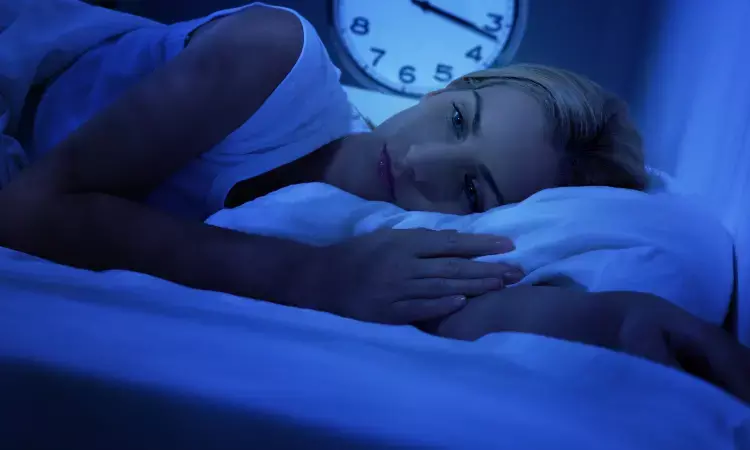- Home
- Medical news & Guidelines
- Anesthesiology
- Cardiology and CTVS
- Critical Care
- Dentistry
- Dermatology
- Diabetes and Endocrinology
- ENT
- Gastroenterology
- Medicine
- Nephrology
- Neurology
- Obstretics-Gynaecology
- Oncology
- Ophthalmology
- Orthopaedics
- Pediatrics-Neonatology
- Psychiatry
- Pulmonology
- Radiology
- Surgery
- Urology
- Laboratory Medicine
- Diet
- Nursing
- Paramedical
- Physiotherapy
- Health news
- Fact Check
- Bone Health Fact Check
- Brain Health Fact Check
- Cancer Related Fact Check
- Child Care Fact Check
- Dental and oral health fact check
- Diabetes and metabolic health fact check
- Diet and Nutrition Fact Check
- Eye and ENT Care Fact Check
- Fitness fact check
- Gut health fact check
- Heart health fact check
- Kidney health fact check
- Medical education fact check
- Men's health fact check
- Respiratory fact check
- Skin and hair care fact check
- Vaccine and Immunization fact check
- Women's health fact check
- AYUSH
- State News
- Andaman and Nicobar Islands
- Andhra Pradesh
- Arunachal Pradesh
- Assam
- Bihar
- Chandigarh
- Chattisgarh
- Dadra and Nagar Haveli
- Daman and Diu
- Delhi
- Goa
- Gujarat
- Haryana
- Himachal Pradesh
- Jammu & Kashmir
- Jharkhand
- Karnataka
- Kerala
- Ladakh
- Lakshadweep
- Madhya Pradesh
- Maharashtra
- Manipur
- Meghalaya
- Mizoram
- Nagaland
- Odisha
- Puducherry
- Punjab
- Rajasthan
- Sikkim
- Tamil Nadu
- Telangana
- Tripura
- Uttar Pradesh
- Uttrakhand
- West Bengal
- Medical Education
- Industry
Vitamin E "best alternative" for treating insomnia in postmenopausal women

Thailand: A study published in Nutrients has addressed the potential of Vitamin E as an alternative therapy in managing insomnia, a common problem faced among postmenopausal women. The study has discussed the role of Vitamin E in improving sleep quality and reducing the usage of sedative drugs.
It is already known that chronic insomnia disorder is a complex disease with multifactorial aetiology. There are various pharmacological and non-pharmacological therapeutic options available to treat the condition.
Vitamin E usage is highly prevalent among postmenopausal women. It has the role of both a dietary supplement and an anti-ageing agent.
Previous research has focused on Vitamin E's role in dealing with hot flashes (estrogen deficiency). Researchers hypothesized that "Vitamin E may treat insomnia" due to the pathway it follows reducing oxidative stress via restoration of glutathione peroxidase levels and suppression of malondialdehyde.
Approaching towards more recommendations for treating insomnia, researchers investigated the hypothesis mentioned above.
The study points include the following:
- The study had 160 postmenopausal women with a history of chronic insomnia disorder; these were randomly divided into two groups: the Vitamin E and placebo groups.
- The women in the vitamin E group received 400 units of mixed tocopherol daily.
- The placebo group took similar identical oral capsules.
- Pittsburgh Sleep Quality Index (PSQI) was used to assess sleep quality and was the primary outcome.
- Sedative drug usage was the secondary outcome.
- The median PSQI score at baseline was slightly higher in the vitamin E group than in the placebo.
- One month post-intervention, the PSQI score was significantly lower in the vitamin E group compared with the placebo; this indicates better quality of sleep in the Vitamin E group.
- The vitamin E group had a higher improvement score than the placebo.
- The percentage of patients using the sedative drug was reduced in the Vitamin E group.
The present study has addressed the potential of vitamin E's potential for managing chronic insomnia. It is also associated with the reduction of sedative drugs.
The researchers said, "Our study is the first one evaluating the role of vitamin E on chronic insomnia disorder. We used a simple, standardized, Thai version validated PSQI questionnaire, which formed the strength of our study."
Our study had limitations like non-evaluation of serum vitamin E before and after the intervention and unknown long-term results.
Oxidative stress plays a vital role in chronic insomnia. This could be improved via Vitamin E supplementation. Further studies are required with elaborated findings and correlations, including oxidative stress and anti-oxidative levels, sleep disturbances and changes in pre- and post-antioxidant.
Further reading:
Thongchumnum W, Vallibhakara SA-O, Sophonsritsuk A, Vallibhakara O. Effect of Vitamin E Supplementation on Chronic Insomnia Disorder in Postmenopausal Women: A Prospective, Double-Blinded Randomized Controlled Trial. Nutrients. 2023; 15(5):1187. https://doi.org/10.3390/nu15051187
BDS, MDS in Periodontics and Implantology
Dr. Aditi Yadav is a BDS, MDS in Periodontics and Implantology. She has a clinical experience of 5 years as a laser dental surgeon. She also has a Diploma in clinical research and pharmacovigilance and is a Certified data scientist. She is currently working as a content developer in e-health services. Dr. Yadav has a keen interest in Medical Journalism and is actively involved in Medical Research writing.
Dr Kamal Kant Kohli-MBBS, DTCD- a chest specialist with more than 30 years of practice and a flair for writing clinical articles, Dr Kamal Kant Kohli joined Medical Dialogues as a Chief Editor of Medical News. Besides writing articles, as an editor, he proofreads and verifies all the medical content published on Medical Dialogues including those coming from journals, studies,medical conferences,guidelines etc. Email: drkohli@medicaldialogues.in. Contact no. 011-43720751


